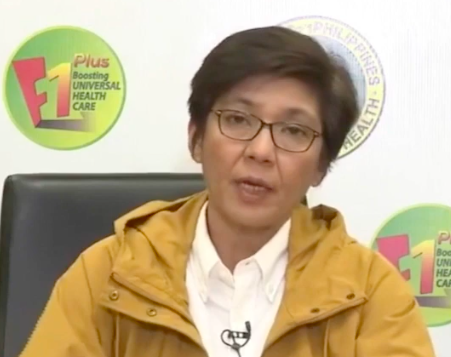
DOH Usec. Maria Rosario Vergeire, FILE PHOTO
MANILA, Philippines — The Department of Health (DOH) said Monday that the National Kidney and Transplant Institute (NKTI) is conducting swab tests and providing appropriate benefits to its employees, citing information from the chief of the hospital.
Health Undersecretary Maria Rosario Vergeire said this after the NKTI-Alliance of Health Workers (AHW) staged a silent protest on Saturday “to demand safety and protection from the deadly coronavirus disease” as the hospital workers perform their jobs at the frontlines of the fight against the pandemic.
According to Vergeire, DOH officials have spoken with the chief of the NKTI to inquire about the situation at the hospital following the protest.
“The chief of the hospital said na unang-una sina-swab ang mga empleyado sa NKTI. Pangalawa, hindi lang empleyado, pati mga kamag-anak nila ay sina-swab doon,” Vergeire said in a media forum.
(The chief of the hospital said that first of all, NKTI employees are being subjected to swab tests. Second, even their families undergo swab tests.)
“Kapag ang empleyado ay may sakit, inaadmit sa hospital nila at ‘yung mga benepisyo nila na kailangan nila na sinasabi nila ay hindi nila nakukuha ay ibinibigay naman ng hospital,” she added.
(When an employee gets sick, he is admitted at the hospital, and the benefits they say are not being given to them are being provided by the hospital.)
In fact, the chief of the NKTI even showed documents proving that the employees are being subjected to swab tests and are provided benefits, according to Vergeire.
In an earlier statement, NKTI-AHW blamed the number of health workers at the hospital who are being infected with COVID-19 to the “gross negligence” of the management, the DOH, and other government authorities.
“Quarantine protocols are not strictly implemented; there is no free swab test for all frontline hospital workers regularly. Worse, health workers are required to pay for their swab tests and charged to their PhilHealth,” the group also alleged.
Vergeire, however, explained that the swab tests can indeed be charged to PhilHealth.
“Bakit hindi icha-charge sa PhilHealth eh mga empleyado sila ng hospital? At ‘yun naman talaga ang protocol, na kapag ikaw ay isang healthcare worker or even you are not a healthcare worker, as long as you are part of the protocol, you can charge it to PhilHealth,” she said.
(Why won’t you charge it to PhilHealth if they are employees of the hospital? That is really the protocol, that if you are a healthcare worker or even if not, as long as you are part of the protocol, you can charge it to PhilHealth.)
Amid the silent protest, Vergeire also noted that managing the situations at hospitals is a difficult task.
“Just imagine, our chief of hospitals handling all these patients, managing their staff and accommodating lahat ng kailangan para lang maprotektahan ang mga (everything that is needed just to protect) healthcare workers,” she said, assuring that hospital workers are being asked on what else they need in the fight against COVID-19.
She also said that the DOH has been trying to respond to all the requests of healthcare workers from the start of the pandemic—from the provision of personal protective equipment, benefits, and salaries.
Nevertheless, she pointed out that increasing the salaries of medical workers still needs discussion and a law before it can be provided by the government.
“Sana naiintindihan din nga mga tao that we are taking care of them (healthcare workers). We recognize na talagang sila ang importanteng parte ngayon ng response dahil sila ang nag-aalaga sa ating mga pasyente. Kaya naman lahat ng pwede natin ibigay sa kanila ay ibinibigay natin sa kanila,” said Vergeire.
(I hope the public will understand that we are taking care of them. We recognize that they are an important part of the COVID-19 response because they are the ones taking care of the patients. That’s why we are giving them everything we can provide to them.)